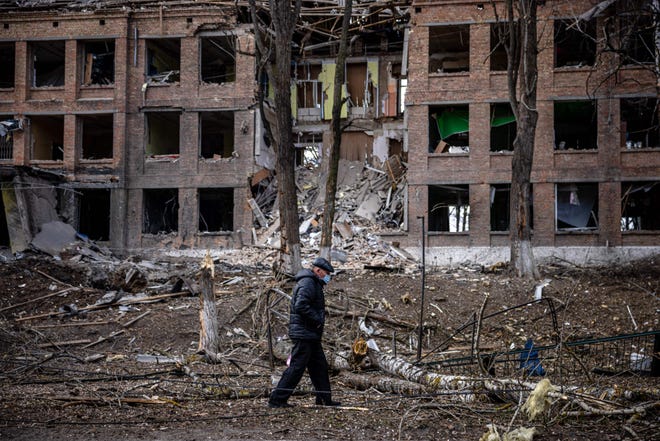Editor’s note: This page recaps the news from Ukraine on Sunday, Feb. 27. Click here to follow the latest updates and news from Monday, Feb. 28, as Russia’s invasion continues.
***
While Russian President Vladimir Putin ordered his country’s nuclear weapons on high alert, more support poured in for Ukraine in its ongoing effort to fend off Russian forces, which on Sunday reached the second-largest Ukrainian city of Kharkiv.
The European Union announced unprecedented new actions against Russia, outlining plans to close its airspace to Russian airlines, fund a weapons purchase to assist Ukraine and ban some pro-Kremlin media outlets, while the Associated Press reported the United States approved the delivery of anti-aircraft Stinger missiles to Ukraine.
Western powers in support of Ukraine could soon be joined by Switzerland, an oftentimes neutral country that on Monday is set to review potential sanctions and asset freezes against Russia, said President Ignazio Cassis via Reuters. Cassis said it was “very probable” the country would follow suit, the outlet reported.https://14e32fbd852dcda47ad98ad8eb441913.safeframe.googlesyndication.com/safeframe/1-0-38/html/container.html
The office of Ukrainian President Volodymyr Zelenskyy on Sunday said a delegation would meet with Russian officials for talks near the Belarus border. The discussion was expected to happen Monday morning local time, according to Ukraine’s Deputy Interior Minister Evgeny Yenin via CNN.
Also Monday, both the 193-member U.N. General Assembly and the smaller, 15-member Security Council plan to hold emergency meetings on Russia’s invasion.
Meanwhile, Putin’s order to make his nuclear weapons more ready for launch – made Sunday in response to “aggressive statements” by leading NATO powers and economic sanctions by the West – represents an unnecessary and dangerous move, according to the Pentagon.
A senior Defense Department official said Russia is under no threat from the United States and its NATO allies. The Pentagon is confident it can protect the U.S. and its allies, said the official, who spoke on condition of anonymity to discuss intelligence matters.
Russia’s invasion of Ukraine is heading towards a fifth day of fighting. According to the Associated Press, Russian troops entered Kharkiv on Sunday, where videos posted on Ukrainian media and social networks showed Russian vehicles moving across the city and a vehicle burning on the street. Residents were urged to stay inside.

The troops in Kharkiv arrived after Russia unleashed a wave of attacks on Ukraine, targeting airfields and fuel facilities. Two large explosions rocked an area south of the capital just before 1 a.m. local time. Zelenskyy’s office said one of the blasts was near the Zhuliany airport and the other blast hit an oil depot about 25 miles south of the capital, according to the mayor of Vasylkiv via the AP. Russian forces also blew up a gas pipeline in Kharkiv, according to the Ukrainian president’s office.Get the Everyone’s Talking newsletter in your inbox.
Get caught up with the trending news you need to knowDelivery: Mon – FriYour Email
Ukrainian officials said Sunday the civilian death toll has reached 352.
A few things to catch you up on:
THE NEWS COMES TO YOU: Get the latest updates on the situation in Ukraine. Sign up here.
WHY IS RUSSIA INVADING UKRAINE? Could this be the start of WWIII? We explain.
BACK IN THE STATES: What is the draft? And can it ever be reinstated here?
BANNED FROM SWIFT?: How banning Russia from the world banking system could impact the country
Russian Central Bank tries to stop ruble’s free fall
Russia’s Central Bank has sharply raised its key rate from 9.5% to 20% in a desperate attempt to shore up the plummeting ruble and prevent the run of banks amid crippling Western sanctions over the Russian war in Ukraine.
The bank’s action follows the Western decision Sunday to freeze its hard currency reserves in an unprecedented move that could have devastating consequences for the country’s financial stability. It was unclear exactly what share of Russia’s estimated $640 billion hard currency coffers will be paralyzed by the move, but European officials said that at least half of it will be affected.
The move will dramatically raise pressure on the ruble by undermining the financial authorities’ ability to conduct hard currency interventions to prevent the ruble from sinking further and triggering high inflation. The ruble has sharply dived in early Monday trading.
The Central Bank also ordered a slew of measures to help the banks cope with the crisis by infusing more cash into the system and easing restrictions for banking operations. At the same time, it temporarily barred non-residents from selling the government obligations to help ease the pressure on ruble from panicky foreign investors eager to cash out.
— Associated Press

More:The enigma of Vladimir Putin: What do we really know about Russia’s leader?
Dalai Lama pleas for peace in Ukraine
The Dalai Lama on Monday pleaded for peace and “mutual understanding,” and said he was “deeply saddened” by the war in Ukraine.
“War is outdated – non-violence is the only way. We need to develop a sense of the oneness of humanity by considering other human beings as brothers and sisters,” the spiritual leader said on his website. “This is how we will build a more peaceful world.”
The Nobel peace prize winner also said any problems and disagreements are best resolved through dialogue. “Genuine peace comes about through mutual understanding and respect for each other’s well-being,” he said.
He also said he hopes peace is swiftly restored.
“We must not lose hope,” he said. “The 20th century was a century of war and bloodshed. The 21st century must be a century of dialogue.”
— Terry Collins